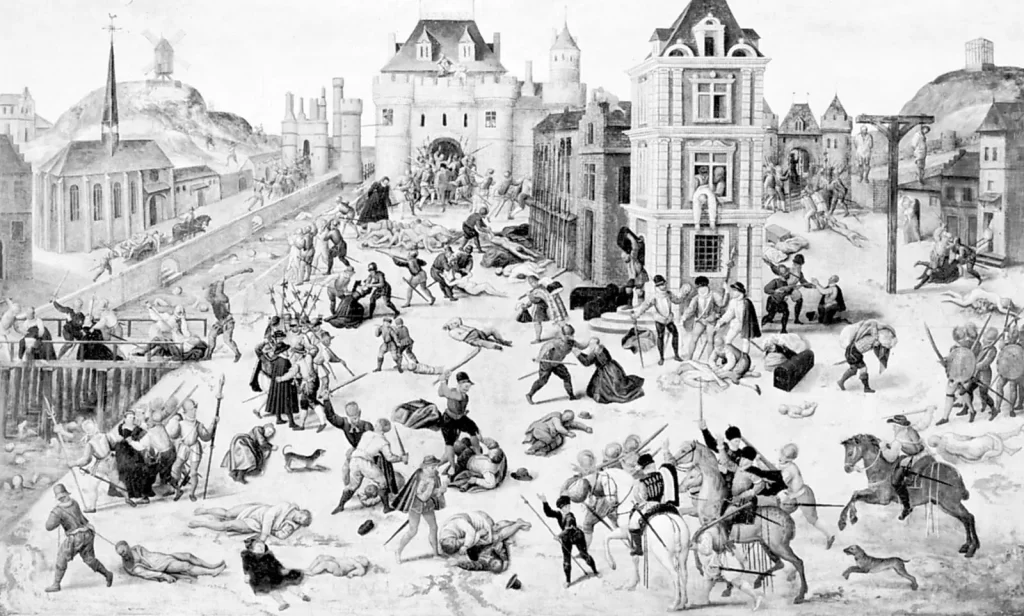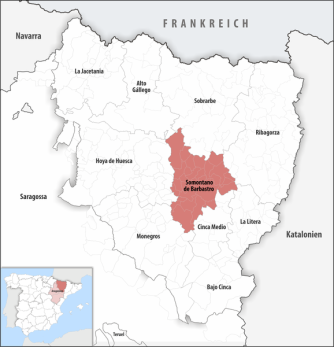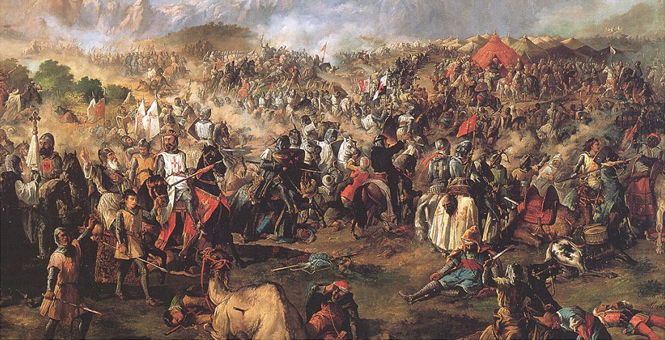The history of Muslims in Andalusia is filled with horrifying stories where Muslims fell victim to the brutality of Christian kingdoms and their European allies. Despite the scientific advancement and prosperity that accompanied Muslim rule in Andalusia, it did not prevent them from being subjected to hundreds of massacres and atrocities, which ultimately led to the Spanish Christian kingdoms’ success in overthrowing Muslim rule in the Iberian Peninsula.
One of the most notable massacres was the massacre of Barbastro in 1064, where Norman armies and their European allies invaded the small city, killing thousands of its inhabitants in one of the worst tragedies to befall Muslims during their rule in Andalusia.
Muslims in Barbastro dispersed while Christians united! On the borders adjacent to the Christian kingdoms in the north, lies Barbastro, the small city situated on a small branch of the Ebro River under the emirate of Zaragoza.
During the 11th century, the Kingdom of Zaragoza was one of the largest emirates of the Taifa era. Initially ruled by the Banu Tujib, Barbastro came under the control of the Banu Hud. When Sulayman ibn Hud, also known as “Al-Musta’in bi-Allah,” passed away, his kingdom was divided among his five sons. The city of Barbastro remained under the control of Saragossa, while his brother Yusuf, also known as “Al-Muẓaffar bi-Allah,” was tasked with governing it.
Meanwhile, Pope Alexander II of the Roman Catholic Church was announcing to European Christians the first Crusade in 1063. Shortly after Pope Alexander II’s announcement, a European alliance began to form in the French region of Normandy, where Norman tribes had settled after being allowed by the King of France.
The alliance’s armies consisted mainly of Norman tribes supported by the French and Burgundians, along with the Papal battalion and local Spanish armies formed from Catalonia and Aragon. The army numbered around 40,000 fighters and marched from southern France towards the Pyrenees, advancing towards Zaragoza. On their way was the city of Barbastro, which they besieged.

In his book “The State of Islam in Andalusia,” historian Abdullah Anan refers to the Crusade against Barbastro led by Guillaume de Montreuil. The Crusaders initially landed on the coast of Catalonia and marched eastward, penetrating the territories of the northern Kingdom of Zaragoza on their way to Barbastro.
The historian Ahmed Al-Maqri mentions in his book “The Scent of Good from the Branch of Moist Andalusia” that Yusuf ibn Sulayman ibn Hud, the governor of the city, failed to protect Barbastro adequately and left its people to the invaders.
This aligns with Abdullah Anan’s account, indicating that Al-Muqtadir, the ruler of Zaragoza, did not take the initiative to save the besieged city, as it was under the jurisdiction of his brother Al-Muzaffar. This was considered cowardice and treachery according to Anan. Both rulers faced the consequences later, and Yusuf himself couldn’t save it either, leaving it to its fate.
Barbastro Massacre: When the Norman army invaded the Muslims of Barbastro The European alliance armies besieged the city of Barbastro for forty days. During this time, the Muslims held out within the walls of their fortified city, engaging in numerous battles on its outskirts against the European alliance armies. The Muslims managed to repel several attacks on the city.
Barbastro received its water supply through a channel that transported water from the river to the city center using advanced technology. As the siege intensified, one of the city’s inhabitants betrayed it and revealed the secret of the channel to the invaders.
Pope Alexander II’s army blocked the channel with rocks, exacerbating the suffering of the city’s inhabitants who endured severe thirst.

Facing the severe drought, the inhabitants of Barbastro sent emissaries to the Normans, offering surrender on the condition of securing their lives and the lives of their children, and leaving the city without any belongings. The Normans agreed to these terms.
However, the Normans broke their promise and killed everyone who left the city. Only a few dignitaries of Barbastro, its commander Ibn al-Tawil, its judge Ibn Isa, and a few other nobles were spared from the massacre by the Normans and their allies.
The European alliance armies excelled in the brutality unleashed upon Barbastro. Their commander, Guillaume de Montreuil, called upon everyone to return to their homes with their families. Once they did, the allied army seized Barbastro’s houses, including its residents and belongings, as mentioned in the book “Al-Hull al-Mawshiya fi Dhikr al-Akhbar al-Marrakushiya.”
Each person allocated to a house took possession of its inhabitants, including family members and belongings. They seized vast amounts of wealth. Even the campaign’s leader, Guillaume de Montreuil, alone took possession of 1500 slave girls and 500 camel loads of clothing.
They did not hesitate to commit the most heinous crimes of murder and rape. The number of Muslims killed during the massacre was estimated to be around 50,000, while other accounts put it at 100,000.

One of the cruelest scenes witnessed during the massacre was the soldiers raping virgin women in front of their fathers and violating married women in the presence of their husbands and families.
Nine months after the massacre of Barbastro and its fall to the Normans, Muslims succeeded in retaking the city.
The echoes of the Barbastro massacre reverberated throughout Andalusia, deeply affecting the Muslim psyche. Among those who regretted not supporting and rescuing Barbastro was Al-Muqtadir ibn Hud, who called for a general mobilization in Andalusia and declared jihad to liberate Barbastro in an attempt to silence the voices holding him responsible for what happened.
Nine months after the massacre, and with Barbastro falling into the hands of the Normans, a Muslim army under the leadership of Ibn Hud set out. Meanwhile, Al-Mu’tamid ibn Abbad, the ruler of Seville, sent battalions from his army to march together in 1065 towards Barbastro. They laid siege to it and breached its walls.
The Muslims turned the tide and managed to repel the Normans’ army. During that battle, the Muslims killed most of the Norman soldiers who had taken refuge in the city. Ibn Hud, after the battle, took about five thousand Christian prisoners to Zaragoza.
Sunna Files Free Newsletter - اشترك في جريدتنا المجانية
Stay updated with our latest reports, news, designs, and more by subscribing to our newsletter! Delivered straight to your inbox twice a month, our newsletter keeps you in the loop with the most important updates from our website












